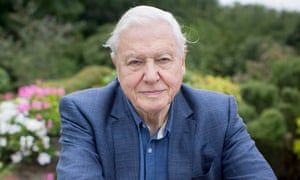Sir David Attenborough
has said he is more encouraged about the future health of Earth than he
has been for some time after a “worldwide shift” in attitudes about
concern for the natural world and the damage that humans are doing to
the planet.
The veteran wildlife broadcaster said there are “signs of hope” for the health of the planet and called the Paris climate change agreement a “big advance” in an interview at the Edinburgh TV festival despite President Donald Trump’s disengagement.
“I spend a lot of time wringing my hands and saying how dreadful it is that this forest has been obliterated and that sea has been polluted and whatever,” Attenborough said. “But there are signs of hope.
“I have the sense that worldwide, certainly in Europe, certainly in China – which we never thought before was concerned – and even perhaps if I may say so there are people in America – pace Mr Trump – who don’t accept that human beings can do no wrong.
“There has been a worldwide shift, I think, among people in general about the concern there should be for the natural world. I am encouraged more than I have been for some time.”
The Paris climate change agreement between nearly 200 countries tried
to limit the increase in global temperatures compared with the
pre-industrial age to well below 2C and ideally to 1.5C. The agreement
was signed last year but Trump pulled the US out of the deal after
becoming president.
“I think the Paris agreement represents another big advance,” Attenborough said. “I would like to think the reason that political figures can adopt that sort of policy, which they know will be at a cost to their national economies, is that they are beginning to realise that people worldwide wish for that happen because they wish to protect their natural world.”
The 91-year-old – who was described by Barack Obama as a “great educator” when they met in 2015 – argued that natural history programmes had a vital role to play in educating people about conservation issues. One of the tasks of the BBC, he added, was keep the natural world at the forefront of people’s minds.
“The effect that human beings are having on the natural world is profound,” he said. “We are having a great damaging effect. Because we are out of touch with the natural world in a way that we weren’t 200 years ago [because of urbanisation] that means most of us don’t see the effect we are having. What is more, we don’t understand the processes of the natural world, which makes this [natural history broadcasting] of crucial importance to the future of humanity.”
Attenborough also admitted that he cried watching the birth of an elephant with crippled back legs – which eventually learned to walk – and seeing a herd of elephants seemingly grieve over the bones of dead elephants. “One of the things that has brought tears to my eyes is particularly elephant sequences,” the veteran broadcaster said.
The veteran wildlife broadcaster said there are “signs of hope” for the health of the planet and called the Paris climate change agreement a “big advance” in an interview at the Edinburgh TV festival despite President Donald Trump’s disengagement.
“I spend a lot of time wringing my hands and saying how dreadful it is that this forest has been obliterated and that sea has been polluted and whatever,” Attenborough said. “But there are signs of hope.
“I have the sense that worldwide, certainly in Europe, certainly in China – which we never thought before was concerned – and even perhaps if I may say so there are people in America – pace Mr Trump – who don’t accept that human beings can do no wrong.
“There has been a worldwide shift, I think, among people in general about the concern there should be for the natural world. I am encouraged more than I have been for some time.”
“I think the Paris agreement represents another big advance,” Attenborough said. “I would like to think the reason that political figures can adopt that sort of policy, which they know will be at a cost to their national economies, is that they are beginning to realise that people worldwide wish for that happen because they wish to protect their natural world.”
The 91-year-old – who was described by Barack Obama as a “great educator” when they met in 2015 – argued that natural history programmes had a vital role to play in educating people about conservation issues. One of the tasks of the BBC, he added, was keep the natural world at the forefront of people’s minds.
“The effect that human beings are having on the natural world is profound,” he said. “We are having a great damaging effect. Because we are out of touch with the natural world in a way that we weren’t 200 years ago [because of urbanisation] that means most of us don’t see the effect we are having. What is more, we don’t understand the processes of the natural world, which makes this [natural history broadcasting] of crucial importance to the future of humanity.”
Attenborough also admitted that he cried watching the birth of an elephant with crippled back legs – which eventually learned to walk – and seeing a herd of elephants seemingly grieve over the bones of dead elephants. “One of the things that has brought tears to my eyes is particularly elephant sequences,” the veteran broadcaster said.

No comments:
Post a Comment